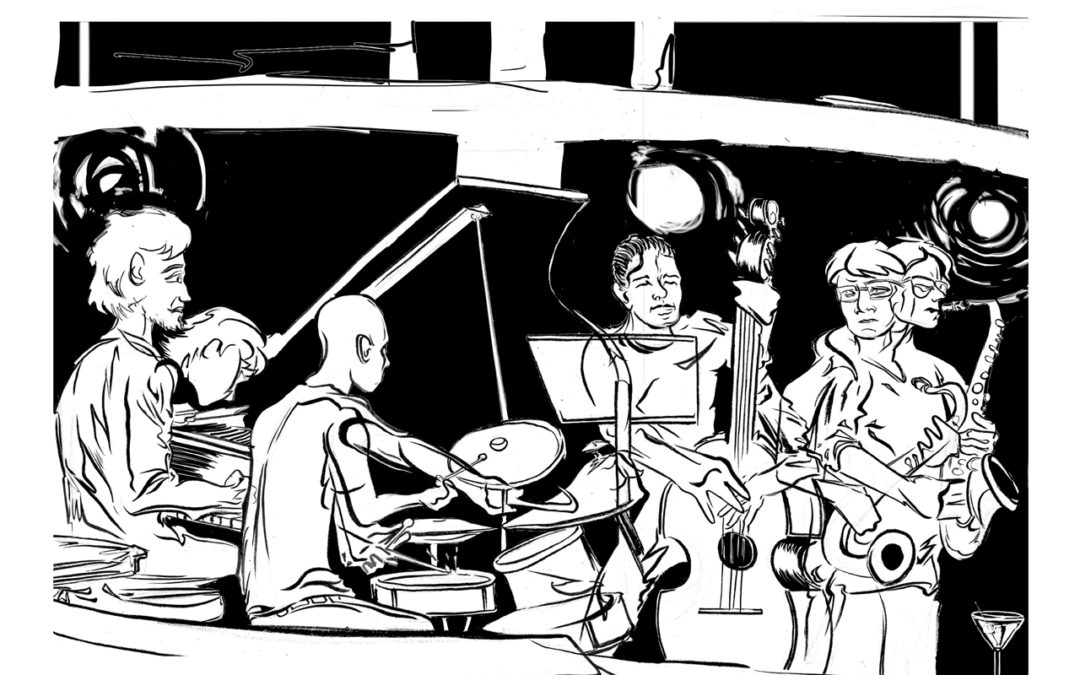Original artwork by Reed Olsen.
Creating in Crisis
In her essay Arts Advocacy, Toni Morrison writes:
“Whenever anyone begins to think about arts advocacy, a complex obstacle presents itself at once: artists have a very bad habit of being resilient, and it is that resilience that deceives us into believing that the best of it sort of gets done anyhow— and the ‘great’ of that ‘best’ sort of lasts anyhow. The public and even academic perception is that nothing, neither social nor personal devastation, stops the march and production of powerful and beautiful artworks.”
The global COVID-19 pandemic has offered an unprecedented and wholly unique experience of both social and personal devastation. Almost overnight, musicians, performing artists, and the many invisible hands behind Seattle’s brilliant creative gig economy found themselves out of work, suddenly and indefinitely.
On the evening of March 11, the day the first of many Washington state mandates limiting events and gatherings was announced by our calm and cautious governor, myself and good friend Reed—a visual artist who, like many, supplements his income in the service industry— went out to Vito’s, knowing it would be one of the few opportunities to feel the effects of live music together. Those effects, we all know well, are healing in their immediacy and their intimacy.
Braving the unknown, pianist Tim Kennedy and his group played to a sparse room. Cutting through the heavy air, Kennedy cracked the tension with his quick wit and bright tone. “Hey everybody, we’re BANDemic,” he opened, “We have a tip jar up here that’s about as empty as our gig calendars. If you have a steady income, feel free to contribute to ours.” The crowd chuckled and many complied throughout the night, gleefully throwing what they had to offer in the jar with a broad grin of appreciation, keeping at arm’s distance.
The illustrations you see on the cover of this month’s Earshot Jazz magazine and on the following pages were created by Reed that night, a reminder of the fleeting beauty and ephemerality of live music. No two performances are ever the same. They also serve as a reminder that we are all connected to a broader art network, a network that binds us through our humanity.
We are all braving the unknown and I’d be misleading you if I said that I’m not feeling the weight of the world right now, which has already changed dramatically since that night and the time I am writing this, on March 20, 2020, and exponentially so by the time you are reading this, sometime in April.
I’m uncertain about a lot, but what I do know is that our perspective is forever altered. Morrison reminds us, continuing in Arts Advocacy:
“Accustomed to their grief, their single-minded capacity for it and their astonishing perseverance in spite of it, we sometimes forget that what [artists] do is in spite of distress—not because of it.”
I have been endlessly inspired by the number of creative pivots in spite of COVID-19, from livestream concerts and music lessons, to DIY hair cutting tutorials, to mutual aid movements to sew face masks for health workers.
I also know that this water we’re in is draining, the ebb and flow of creation and inspiration to make waxes and wanes and the mental exhaustion, stress, and pressure to produce is not inconsequential.
Creating in crisis—there’s two ways to read that.
On March 9, Earshot sent out a short and hastily made Impact Survey for artists, educators, presenters, and venue representatives to share their experiences with us. The following pages include those responses and offer ideas on how we can show our support now—in this moment of uncertainty and social distancing.
The city of Seattle and numerous organizations—including Arts Fund, Artist Trust, 4Culture, and the Seattle Foundation—have responded in big, tangible ways, providing immediate, mostly unrestricted emergency relief support in the form of grants, rent moratoriums, and more. An incomplete list of our region’s growing resources can be found on page 6. I’m proud of our city’s response to this moment and I ask, how can we take this display of arts advocacy and weave it into systemic change? I don’t have the answers, but I know this is an opportunity to examine ourselves, our sector, and our society.
The arts and music may not be classified “essential” business under government mandates, but I know, and you—Earshot Jazz reader know— that the arts and music are classified essential to our humanity. Now is the time to live our values. Let’s do our part to provide immediate relief, and imagine a new future of a supportive net together—because yes, there is a future.
–Tara Peters, Editor, Programs Manager





